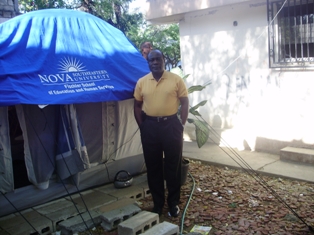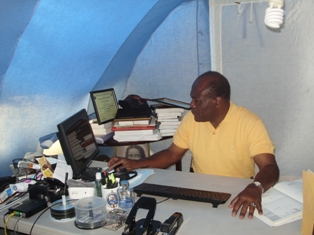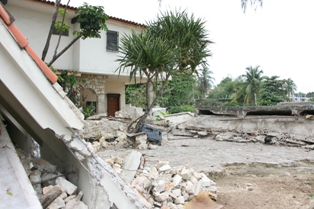NSU Newsroom
SharkBytes
Horizons
This version of NSU News has been archived as of February 28, 2019. To search through archived articles, visit nova.edu/search. To access the new version of NSU News, visit news.nova.edu.
This version of SharkBytes has been archived as of February 28, 2019. To search through archived articles, visit nova.edu/search. To access the new version of SharkBytes, visit sharkbytes.nova.edu.
Fischler Student Works to Restore Haiti’s Schools While Attending Classes from a Tent
True leaders look for solutions, even in the darkest of times. And when doctoral student Antoine Atouriste first decided to pursue a degree in Organizational Leadership through NSU’s Fischler School of Education and Human Services, he had no idea how soon good leaders would be in demand.
When the catastrophic earthquake of Jan. 12, 2010 ravaged Haiti, it left more than 250,000 dead, more than 300,000 injured, and more than a million without homes. With a collapsing infrastructure and a population fighting to survive, relief could not come soon enough.
Atouriste survived, though his family home and many he knew did not. Yet, he continued to take online classes at NSU even setting up a make-shift study room in a tent.
As the country rebuilds and looks to the future, many are still struggling to regain a small taste of their post-earthquake lives. Normal, everyday opportunities – such as going to school – may seem like a luxury.
But for Atouriste, a National Security Advisor to the Haiti Ministry of Interior and a professor of economics at State University of Haiti, education is a critical component of rebuilding a country that has seen more than its share of tragedy.
With nearly 90 percent of the country’s educational system destroyed, Atouriste knows that education is a crucial part of restoring Haitian infrastructure, society and culture. But, Atouriste also knows that the road to recovery will be long and filled with obstacles.
 “Within about 35 seconds, hundreds of administrators, professors and faculty, and thousands of students were killed or injured that day, and about 85 percent of campus infrastructures were completely destroyed.” Atouriste said. “The numbers have not been officially confirmed, and the amount of those left homeless is even greater.”
“Within about 35 seconds, hundreds of administrators, professors and faculty, and thousands of students were killed or injured that day, and about 85 percent of campus infrastructures were completely destroyed.” Atouriste said. “The numbers have not been officially confirmed, and the amount of those left homeless is even greater.”
According to a report by the Interuniversity Institute for Research and Development, of the 32 major universities surveyed in Port-au-Prince, 28 were destroyed and four were severely damaged. But Atouriste and others like him know that Haiti’s schools must be rebuilt in order to help the country start anew.
“Antoine is truly amazing,” said Charlene Desir, Ed.D., his dissertation chair at NSU. “His dissertation on rebuilding education in Haiti will be one of the first pieces of scholarly work to emerge from the country since the earthquake. Antoine is well-positioned to be intensely involved in rebuilding the system from the ground up, and is dedicated to this cause.”
on rebuilding education in Haiti will be one of the first pieces of scholarly work to emerge from the country since the earthquake. Antoine is well-positioned to be intensely involved in rebuilding the system from the ground up, and is dedicated to this cause.”
